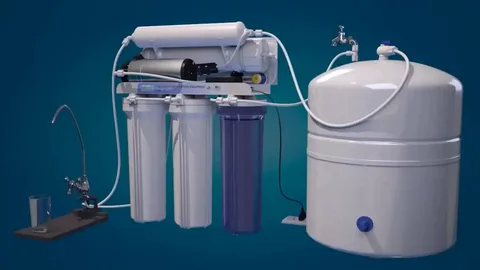How Water Filtration Systems Improve Your Health
Water is essential for life, and the quality of the water you drink can significantly impact your overall health and well-being. A water filtration system offers a practical solution to ensure that your water is free from harmful contaminants. In this article, we will explore how water filtration systems improve your health and home.
1. Clean Water for Better Health
Having access to clean and safe water is crucial for maintaining good health. Water filtration systems remove harmful chemicals, bacteria, viruses, and other contaminants from your tap water. These systems often target substances like chlorine, lead, mercury, and pesticides, which can cause long-term health issues. By using a filtration system, you reduce your exposure to these toxins, which helps lower your risk of diseases such as gastrointestinal issues, skin problems, and even certain types of cancer.
2. Improved Taste and Smell
One of the most immediate benefits of using a water filtration system is the improvement in taste and smell. Tap water often has a distinct chlorine or metallic taste due to the chemicals used in municipal water treatment. A filtration system removes these chemicals, resulting in better-tasting and fresher-smelling water. This makes it more enjoyable to drink, cook with, and even brew coffee or tea. In turn, you may find yourself drinking more water, which is important for staying hydrated and supporting overall health.
3. Skin and Hair Health
Drinking clean water is important, but using filtered water for bathing and showering can also have significant benefits for your skin and hair. Chlorine and other chemicals in unfiltered water can strip the skin of its natural oils, leading to dryness, irritation, or rashes. These chemicals can also weaken hair follicles, leading to hair thinning or breakage. With a water filtration system, you can enjoy softer, healthier skin and hair without worrying about the harmful effects of chlorine and other contaminants.
4. Protection from Harmful Contaminants
Unfiltered tap water can contain various harmful substances, including bacteria, viruses, and heavy metals. Some of these contaminants, like lead, can be particularly dangerous, especially for children and pregnant women. Water filtration systems are designed to effectively remove these harmful substances, providing you with water that is safe to drink and use in cooking. With advanced filtration technologies, such as reverse osmosis or activated carbon filters, you can trust that your water is free from dangerous toxins.
5. Cost Savings
Although investing in a water filtration system comes with an initial cost, it can save you money in the long run. Many people rely on bottled water as an alternative to tap water, but buying bottled water regularly can quickly add up. A water filtration system allows you to enjoy fresh, clean water without the ongoing expense of bottled water. Additionally, these systems help extend the lifespan of appliances like water heaters, dishwashers, and coffee makers by preventing mineral buildup and reducing wear and tear.
6. Environmental Benefits
Using a water filtration system is also a more eco-friendly option compared to relying on bottled water. Bottled water contributes to plastic waste, which harms the environment and fills up landfills. By using a filtration system, you eliminate the need for plastic bottles and reduce your carbon footprint. This small change can have a big impact on the environment, making water filtration a sustainable choice for both your health and the planet.
7. Convenience and Accessibility
Water filtration systems are convenient and easy to use. Most systems are designed to fit under your sink or can be installed on your kitchen countertop, making access to clean water quick and effortless. Many systems provide continuous filtered water without the need for refilling, making it ideal for busy households. With a filtration system in place, you no longer need to worry about purchasing bottled water or relying on water delivery services, which adds to your convenience and peace of mind.
8. Better Cooking and Drinking Experience
Filtered water can improve the taste and quality of your cooking. When preparing meals or beverages like tea and coffee, the quality of water plays a significant role in the final result. Water that is free from contaminants enhances the flavor and freshness of your food. Whether you’re boiling pasta, making soups, or brewing a pot of tea, using clean water ensures your dishes turn out better. Similarly, water that’s free of chlorine and other impurities helps improve the taste of your drinks, making them more enjoyable.
9. Long-Term Health Benefits
Using a water filtration system is an investment in your long-term health. Chronic exposure to harmful chemicals and contaminants in your water can contribute to serious health problems down the line. By removing these toxins, you safeguard your health now and in the future. Clean water supports healthy organs, detoxifies the body, and aids in digestion, ensuring that you stay healthy and energized. With a water filtration system, you give yourself and your family the gift of clean water for years to come.
10. The Impact on Your Home Appliances
Water filtration systems also protect your home appliances from the negative effects of hard water and mineral buildup. Over time, minerals like calcium and magnesium can accumulate in your pipes and appliances, reducing their efficiency and lifespan. Filtration systems designed to remove these minerals can help protect your plumbing, dishwasher, washing machine, and water heater, saving you from costly repairs or replacements. In the long run, this can help you maintain a well-functioning home with fewer maintenance issues.
Conclusion
Water filtration systems are a simple yet impactful solution for improving your health and home. By removing harmful contaminants, they provide clean, safe, and great-tasting water for drinking, cooking, and bathing. These systems not only support better hydration and overall health but also protect your appliances and reduce environmental waste. Investing in a water filtration system ensures a healthier lifestyle for you and your family while contributing to a more sustainable future. Clean water is not just a convenience—it’s a necessity for a thriving and healthy life.
FAQs
Q1: What are the different types of water filtration systems?
A1: Common types include activated carbon filters, reverse osmosis systems, UV purifiers, and distillation units. Each system targets different contaminants to provide safe, clean water.
Q2: How do I know if I need a water filtration system?
A2: If you notice unpleasant tastes, odors, or if your water is hard, discolored, or has visible particles, a filtration system can help improve water quality and safety.
Q3: Can water filtration systems remove all contaminants?
A3: While filtration systems are highly effective, no system can remove 100% of contaminants. However, high-quality systems can remove the most harmful substances.
Q4: How often should I replace the filters in my system?
A4: Filter replacement frequency depends on the type of system and usage. Typically, filters should be replaced every 6 months to 1 year for optimal performance.
Q5: Are water filtration systems expensive?
A5: While the initial cost of a water filtration system can vary, it is generally more cost-effective than purchasing bottled water long-term. Additionally, many systems offer affordable maintenance options.

